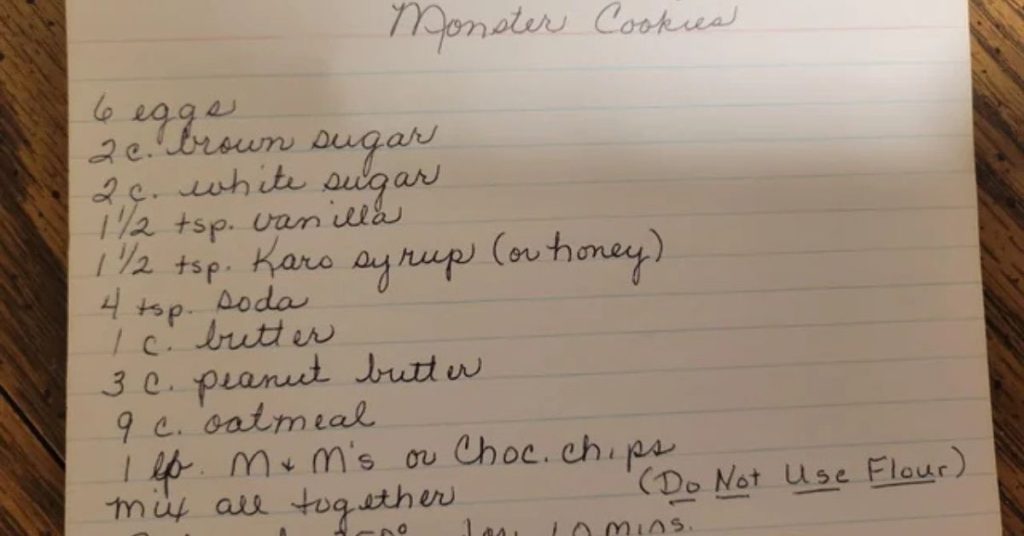An old note card found in a grandmother’s cupboard turns an online baking forum into a meditation on heritage, flavor, and the quiet power of shared nostalgia.
In a small corner of the internet, amid the scroll of glossy food photography and meticulously staged sourdough loaves, a simple image caught the eye of thousands. Posted to the subreddit r/Baking, one user shared a time-worn recipe card discovered while helping move their grandmother into a new home.
The post, titled “Found this recipe in my Grandma’s cupboard,” was less about culinary mastery than the fragile power of memory — and how food binds generations.
The photograph accompanying the post showed a yellowed card, its cursive softened by years of handling. The recipe itself was ordinary — some variation of a peanut-based dessert — but the discovery was extraordinary in the eyes of readers. “What a wonderful cookbook!!!” one commenter wrote. “I have seen several recipes I want to try.” Another added simply, “Thank you so much for this gift. I really appreciate your love for the old cooking.”

For a community often consumed by debates over hydration ratios and oven thermodynamics, the post struck a different tone. It was nostalgia distilled: a reminder that baking is as much about lineage as it is about leavening.
The original poster confessed to a complication: a peanut allergy that made the rediscovered recipe a risky proposition. That detail lent the story a quiet poignancy — the yearning to reclaim a family flavor colliding with the limitations of the modern body.
The allergy note also turned the comments section into a makeshift test kitchen. Within hours, users were offering substitutions: almond butter, sunflower seed paste, tahini, or even browned butter for richness without nuts. “Start with a small batch,” one user advised. “You can eyeball your ratios and see how the texture comes together.”
But it wasn’t just problem-solving that drew people in. The thread became a forum for collective remembering. Many spoke of their own grandmothers’ kitchens — the handwritten cookbooks, the stained index cards, the clipped newspaper recipes folded into envelopes.
“This looks exactly like the box my Nana kept in her pantry,” one commenter reminisced. “Every card smelled like cinnamon and dust.” Another recognized the handwriting style itself: “That cursive belongs to a generation that measured with heart instead of spoons.”
Several users attempted to trace the recipe’s lineage. “This is a recipe out of one of the old 1960–1970s Campbell’s cookbooks,” one commenter surmised, noting the telltale combination of canned soup and butter — a mid-century shorthand for comfort food.
Another speculated it might have been a church or community-fair recipe, shared by word of mouth long before precise measurements or temperature controls were the norm. The collective detective work turned the thread into a kind of culinary archaeology, piecing together fragments of a vanished domestic world.
In a time when algorithms increasingly determine what recipes rise to the top of our feeds, the appeal of this post lay in its imperfection. The handwriting was hard to read, the quantities uncertain, the ingredients out of step with today’s health standards.
Yet that very roughness made it real. “The only way you say it’s ‘not right,’” one reader observed, “is that it should be a very big portion.” The comment drew laughter and hundreds of upvotes — a reminder that abundance was once the measure of generosity.
The popularity of the post underscores a broader cultural shift. Across Reddit, TikTok, and Instagram, younger cooks are turning back to analog sources: recipe cards, scanned church cookbooks, and family scrapbooks. It’s not only about flavor, but about authenticity — the tactile link to people who cooked without digital timers or viral validation.
The handwriting, the stains, even the misspellings become symbols of continuity in an age of disposability.
In this sense, the r/Baking post functioned less as a recipe share and more as a ritual. Readers didn’t just want to bake the dessert; they wanted to resurrect the memory, to imagine the kitchen where it first came alive. “Keep these safe,” one user implored. “They’re more precious than gold.” Another wrote, “Every time you cook one, you’ll feel like she’s there with you.”
For the poster, that may have been the truest reward. The thread ended not with a photo of the finished dish but with gratitude — for the advice, the encouragement, and the shared reverence for the kind of cooking that can’t be digitized.
In a comment that seemed to capture the mood of the entire exchange, one user wrote, “Recipes like these remind us that love was the first ingredient. Everything else is just substitution.”
Seven decades ago, someone’s grandmother wrote a recipe card, likely without imagining it would one day circulate online among strangers from around the world. Yet through this accidental act of preservation, she joined a new generation of bakers — proof that flour, sugar, and memory still have the power to rise.